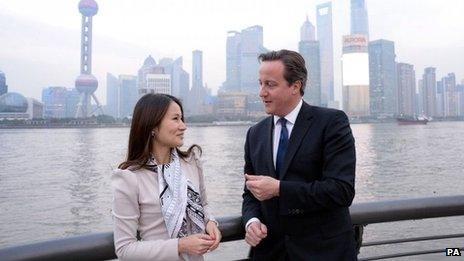China - we want them but do they want us?
- Published

One question hangs over this trip like smog in the Chinese air. Britain may be desperate for a bigger share of China's money and markets but how much do they really need or care about us?
The upbeat official talk of an indispensable partnership between the two countries is challenged by an editorial in the state-run tabloid The Global Times, which declared today that "Britain is no longer any kind of 'big country', but merely a country of old Europe suitable for tourism and overseas study, with a few decent football teams".
Asked about that, the prime minister said: "I must have missed the bit about the football teams. I would just prefer to go on the figures. This is a visit that has delivered almost £6bn worth of deals.
"It is a visit that comes on the back of an 18-month period where we have seen more Chinese investment into Britain... than in the previous 30 years. And also it is a visit where we have seen very good, high-level, substantial discussions both with the premier and with the president - the premier who described the partnership as indispensable. So I will stick with the facts and the figures."
British jobs underwritten by Chinese money were the vision he pitched to 500 business leaders in Shanghai. Partnership with Britain was good for China too, he claimed - a point he made in five words of Mandarin: "Wei shuang fang you li" or "in both sides' interest".
Later, I asked him whether he felt frustrated that many people didn't appear to understand the importance of opening up China.
He replied: "No I don't. I think the British public have a very good understanding of what I describe as the long-term plan. They know that Britain, having had some very difficult years, having suffered badly in the crisis, is on a mission to rebuild.
"That means sorting out your finances at home and getting the deficit under control. But it means making your way in the world and it means recognising that we can't just rely on European markets.
"We have to go further afield and we have to play to our strengths and win. I think people have a very good understanding of that... I think people fully understand this is an important part of a prime minister's job - to get out there and beat the drum for your country, to stand up for business investment and jobs."
One Chinese student asked David Cameron why he was acting more like a businessman than a PM. His answer was to insist several times that he was not apologetic about that.